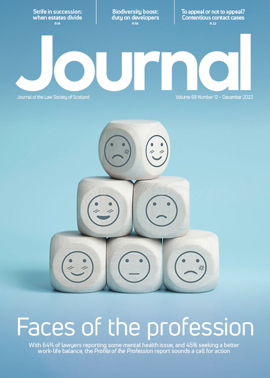Doulas: living and dying well in Scotland

An end-of-life doula is a supporter or companion who walks alongside people living with a life-limiting illness, their families, and those close to them. Doulas are a consistent, flexible presence, able to fill the gaps, be the sand in the jar, and take on various roles in support – practically, emotionally, and if desired, spiritually.
They may begin the relationship with families from the time of diagnosis, or in the later stages, and often continue to provide support to the family after the death. Their aim is to help people to feel safer and more at peace with death and dying, whether they wish to die at home, in a hospice or hospital.
The term “doula” (pronounced doo-la) comes from the Greek word meaning “female servant” and is sometimes used to describe a woman who assists another woman during labour, providing emotional and practical support to her, the baby, and the family after the birth. End-of-life doulas provide emotional, spiritual, and practical support to people who are dying.
I am training as an end-of-life doula with Living Well Dying Well (www.lwdwtraining.uk/), a not-for-profit organisation providing comprehensive training and supervision for doulas. It also works to promote discussion and awareness around how to live life fully while planning and preparing for the end of life in a safe and supportive way.
I am also a private client solicitor in Edinburgh, and over the last 15 years I have worked with many clients who want to put some thought and planning into how they would like the later stages of their lives to be. They want to take control and responsibility by putting down on paper what they would like to happen, or not happen, if they lose mental capacity or are diagnosed with a life-limiting illness, as well as after their deaths. I assist with wills, powers of attorney and advance medical directives, and encourage clients to discuss and write down their detailed funeral wishes and put together playlists of the songs that capture the essence of their lives. I direct them to www.finalfling.com/ and www.playlistforlife.org.uk/ to help them to explore options and capture what is important to them. That way, if capacity is lost, and in their final days and after their deaths, each person can still be entirely himself or herself.
Clients may say that they don’t like to think or talk about their own deaths, and find it “morbid” or “depressing”. Death has become a medical event rather than a natural part of life, and the common perception is that doctors and funeral directors hold the control. They don’t; you do. Most people don’t realise how much control and how many options they have, if only they would take time to think and plan.
Very few of my clients, and indeed few of my colleagues, have heard of doulas. However, there is a growing body of men and women, already practising or training as doulas in this country, committed to supporting people who are dying.
Training involves a 21 day programme accredited by the Crossfields Institute, leading to a Diploma in Companionship, Advocating for Families and Individuals at the End of Life. The programme is divided into three modules, mostly arranged over three-day weekends, and by the time I qualify, will have taken me two years to complete and cost around £3,000. We cover subjects such as beliefs around death, communication, family dynamics, advance care planning, integrative healthcare, relaxation techniques, safeguarding, the physical changes in a person moving closer to death and how to care for them at each stage, care of the body after death, socio-legal tasks, funeral planning, reflection on our own personal values, beliefs and experiences of death and grief, and different kinds of grief.
The most powerful piece of learning I have experienced so far was a guided meditation on my experience of my own death. It began: “Imagine you have been told you have seven days left to live”, and brought into sharp focus what feels important to me in my dying process – where I want to be, who I want with me, my fears, my hopes. Now that I am working with my first client, I can draw on that meditation to better understand and support him in his own process.
Part of the doula role may be to work with the dying person to complete an advance medical directive, and to encourage him or her to think about a power of attorney, will and funeral plan. But that is only one part of what a doula can bring. Openhearted loving kindness, care, reassurance and support are at the centre of what we do.
In this issue
- Form that misses the mark
- The dual role: before and after
- Don't just write – plan
- CMS enforcement: little help when needed?
- Flight or fight
- Reading for pleasure
- Opinion: Campbell Deane
- Book reviews
- Profile
- President's column
- Knowledge base becomes smarter
- People on the move
- Brexit: planning for "What if?"
- Report card
- Greater good and greatest need
- Finances: big not always better
- Doulas: living and dying well in Scotland
- Lobbying: the new regime
- Protect yourselves, Society warns
- Ending short sentences: impact on the courts
- Board policy: do not shake
- Brexit and professional sport
- Rely on HMRC's guidance at your peril
- Standard missives: an unachievable dream?
- Let in-house keep you right
- Accredited specialists: five years can qualify
- What's Daisy done?: Society's new campaign
- Law reform roundup
- Wartime honour
- Paralegal pointers
- Society sets up secure channel
- All fee earners now
- Stand up to your stammer
- The data imperative
- Ask Ash
- In-house: my client, my job?
- Q&A corner
- Giving cheques a new image






